Previous | Next | Senate races | Menu
New polls:
Dem pickups: (None)
GOP pickups: (None)
100 Days of Donald Trump
After 100 days, presidents get a report card. It wasn't always like this, but FDR did so much in his first 100 days that since then, that has been the benchmark (a small step toward the metric system?). There are stories about Donald Trump's 100th day everywhere; for example, The New York Times, The AP, Politico, U.S. News & World Report, and CNN. The BBC even has a report in Pidgin. Surely, King Charles III is embarrassed. Just type "Trump's first 100 days" into your favorite search engine and you will be inundated. If you want to read just one, we suggest The Guardian. If you can't bear to read this stuff at all and want someone to explain it to you in 56 seconds, here is a video explainer:
Still with us? It's been a whirlwind. Law-abiding migrants and U.S. citizens deported, the world order shattered to bits, violent criminals pardoned, hundreds of thousands of federal workers fired by someone who is not even an officer of the United States, allies abroad torpedoed and enemies embraced, a trade war started, financial markets in turmoil, and the rule of law under fire. We have never seen this much disruption in 100 days, at least not without half the country seceding and making war on the other half. If you want a day-by-day summary of the main news, The Guardian has a good one there, too. Let's look at the first 100 days by topic, though:
- Economics: Trump was elected because people wanted the price of milk and eggs to go down.
So he started a trade war, which will make prices go up. Americans buy a lot of stuff from China, and if the 145% tariff
sticks around for a while, everything imported from China will get much more expensive. So far, Chinese President Xi
Jinping has shown no sign of being willing to deal with Trump. He is waiting for domestic pressure to force Trump's
hand. But even things from other countries may go up in price due to the general 10% tariffs on all other countries. The U.S.
imports $4 trillion in stuff every year. That's a lot of stuff. Some of it is under the radar, as many companies import
raw materials and parts for their end product. If the inputs get more expensive, even domestic companies will have to
raise prices. People aren't going to like that.
There is no evidence at all that Trump is going to try to tackle inflation, the issue that got him elected in the first place.
Trump has spooked the financial markets. They hate chaos. In the 3 days following the "Liberation Day" tariffs, the S&P 500 dropped 10%, then when Trump changed course, it rebounded a bit at first, but is now still off 10% from its high of this year, on Feb. 20. Here is the net change in the S&P 500 in the first 100 days of presidents since Richard Nixon.
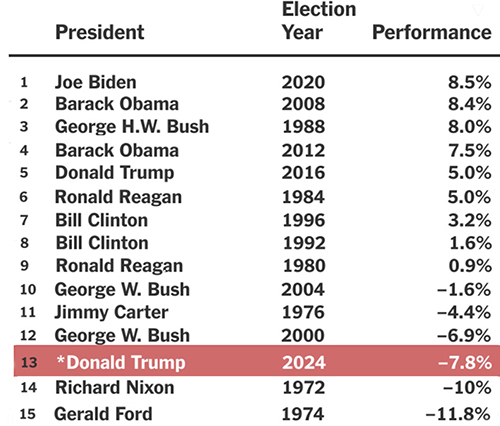
Gee, Fox News may not have liked sleepy old Joe Biden, but the stock market sure did.
- Immigration: Trump has certainly been busy on immigration, but based on his first 100
days, we would estimate the chance of his deporting all 11 million undocumented immigrants, as he promised, to be
roughly zero. He has deported perhaps a few thousand so far, many of those illegally and in defiance of the courts,
including a few U.S. citizens, which is totally illegal. And he has deported many of them to a foreign gulag with a life
sentence, not just dumping them in their home country and telling them not to come back. He certainly never promised that.
Trump has achieved some results, though. Here is a bar chart showing the number of encounters between the Border Patrol and migrants outside the ports of entry—that is, illegal border crossings. They are clearly way down, but they were trending down under Joe Biden.
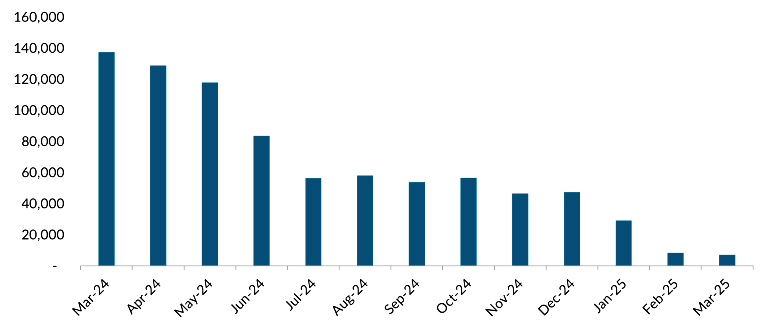
While most of the drop is probably due to potential immigrants being scared to cross, some of it could be due to CBP being distracted due to DEI and other non-border issues and just not functioning well. Also, don't rule out a little book-cooking (which is very different from cookbooking).
- Gutting the Government: One of the things Trump did that was totally unexpected was
installing Elon Musk as a kind of gut-the-government czar and allowing him to take a meat cleaver to the federal
government, killing programs required by law because Musk didn't like them, all in the name of efficiency. Despite
promises to remove $2 trillion in waste, Musk has at best removed $150 billion in programs, but fixing the mistakes he
made has cost $135 billion, so the savings are minimal. Still, he has caused a huge amount of disruption and ruined many
lives, all of it illegally. What Trump could have done (but was in too much of a hurry to do) is ask the compliant
Congress to defund programs he doesn't like. The effect might have been the same, but at least it would have been legal.
Musk's minions have swooped down on almost every government department, taken over, and copied huge amounts of data onto their own laptops. What Musk intends to do with all this data is unknown. There have been many lawsuits about this. Musk's behavior has been a real drag on Trump's approval, so he is slowly being phased out. Still, the Democrats now have a potent talking point for 2026: fight oligarchy. Some of the people illegally fired are surely going to sue Musk personally. Sympathetic juries may decide that the $148 million that Rudy Giuliani was ordered to pay two Georgia election workers was small potatoes.
Some of Musk's "achievements" include dismantling USAID and firing 10,000 people, laying off 1,200 researchers at NIH, cutting thousands of DoD employees, weakening national security, slashing the IRS workforces (which will reduce tax enforcement and cause the deficit to climb), going after the Post Office (which people in rural areas depend on) and, finally, reducing staffing at Social Security, which will affect millions of people. At least 200,000 positions have been eliminated so far, very few of which were wasteful. It is not as though Musk inspected agencies carefully, found waste, and cut it out. It was more like: "I have simply decided to cut your staffing by 40%."
Another thing that Trump did is "invite" government workers to resign. The incentive was not being fired for a few months. Tens of thousands took the deal. Many others were simply fired by e-mail. The damage to the environment, scientific research, catching billionaire tax cheats and much more will take years to fix and the process won't even start until the Democrats next get the trifecta.
Another thing Trump is doing is implementing Schedule F, which reclassifies about 50,000 federal employees from being civil servants (who can't be fired except for proven malfeasance) to political appointees who the president can fire for simply not being enthusiastic enough for him personally. In short, in 100 days, he has badly messed up the government in a way no previous president ever did.
At a cabinet meeting, Musk tried to boss around cabinet officers. Trump didn't like that and started to make it clear to Musk that his power is limited and cabinet officers get to run their departments.
- Rule of law: This is a biggie, although most people don't fully understand what is going
on. Trump stated his views on the rule of law clearly. He didn't say: "L'État, c'est moi," because: (1) he
doesn't speak French and (2) he knows nothing of history. But he did say "He who saves his country does not violate any
law." Nixon was slightly more elegant: "When the president does it, it is not illegal." We know how that worked out, and
for a much, much, much smaller crime (covering up a burglary).
Trump has pardoned about 1,500 people, including all the Jan. 6 rioters, even those who injured police officers. So much for the Republicans being the party of law and order. He has skirted court orders by refusing to provide information about what he did and when he did it. He has attacked multiple judges who have made rulings he doesn't like. It is probably only a matter of time before he openly defies the Supreme Court.
He has ignored due process when deporting people. He has ordered people who have committed no crime to be snatched off the street and disappeared without any opportunity to talk to a lawyer or have a court hearing. He has openly opposed freedom of speech for people whose speech he doesn't like and had some of them arrested and locked up in a distant prison (although mostly in the U.S., so far). He signed an XO that directly contradicts the Fourteenth Amendment on birthright citizenship. He has talked about an (unconstitutional) third term in 2028.
He has intimidated the 10 biggest law firms in the country and got them to agree to give him billions of dollars of free legal work for the "privilege" of entering courtrooms to argue cases for their clients. Even after they agree, in some cases he violates his own agreements and goes back for more.
In short, his view of the law is that it is a weapon to punish his enemies but it does not apply to him at all. His position is: What are you going to do about it?
- Rule by Executive Order: Even though the Republicans have the trifecta, so far Trump has
signed only 5 bills into law, a stopgap-budget bill, three bills overturning Biden-era rules, and the Laken Riley Act,
which gives ICE more power to deport people accused of a crime, even before they are put on trial. His Big Beautiful
Everything Bill keeps getting pushed further into the future every day (more below). Instead, he has been governing by
executive order. He has signed more first-100-day XOs than any president in the past 100 years:
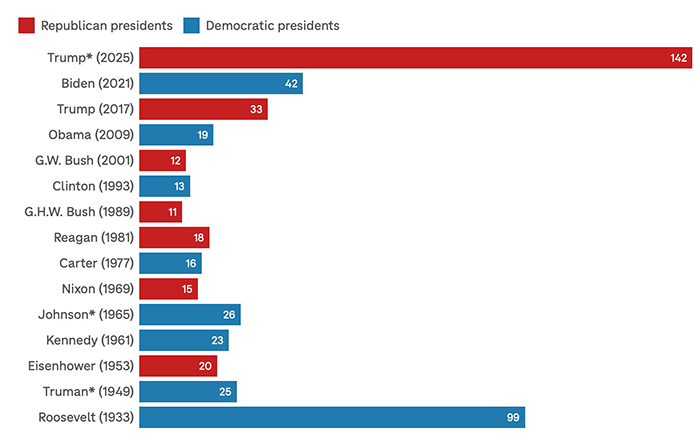
The problem with governing by XO is that the next president can cancel all his XOs on Day 1, but Trump doesn't think long-term and much of his base can't see even as far as dinner time. Also, many of the XOs have been patently illegal and the lower courts have already restrained him from enforcing them, pending full hearings. In the end, they have fed the base enough red meat to give them all heart attacks, but little lasting change will have been achieved.
- Retribution: Something that Trump cares about a lot—but which the Republican
leaders in Congress don't care about at all—is getting even with his (perceived) enemies. He has sued multiple
media outlets and gotten them to pay large amounts in damages rather than go to trial, even though their lawyers have
undoubtedly told their CEOs they would win. He also kicked the AP out of White House briefings, even though no truth is
ever disbursed there. Still, it is a symbolic punishment. The AP's crime: It didn't change the name of an international
body of water (Gulf of Mexico) to his preferred name (even though it did rename Mt. Denali to Mt. McKinley because
it is in U.S. territory and he does have that right).
He is going after top universities by cutting off funding the government has already agreed to. In the commercial sector, this is called breach of contract and is a tort that the injured party can sue for and collect damages. Trump has claimed it has something to do with antisemitism, but even if it did, which it doesn't, that doesn't give him the authority to unilaterally suspend payments for cancer research just to get universities to lick his boots. So far, only Harvard has defied him. That case will surely end up in the Supreme Court eventually. But universities are starting to see that no matter how much they concede, he will simply come back for more. The real goal is to destroy them since they are a kind of power center and train students to think and not just obey orders blindly.
Some of his nominees are openly champing at the bit to trump-up charges to arrest and imprison his political opponents. Particularly enthusiastic about this are AG Pam Bondi and FBI Director Kash Patel. One other, who hasn't been confirmed for a permanent position yet, is Ed Martin as U.S. attorney for D.C. He sees his primary job as punishing Trump's enemies. Actual law enforcement is not on his agenda. He is so open about his goal that Senate confirmation may not be so easy.
- Foreign Policy: Trump has been unusually active in foreign policy, something few
presidents are unless they inherit a war somewhere. He allowed Musk to kill off USAID, which helps people around the
world, saves many lives by distributing free medicine and in many other ways, and builds a huge amount of goodwill for
less than 0.7% of the federal budget. But why stop pandemics from spreading in Africa? After all, germs can't fly.
That's why the COVID-19 virus never made it from China to the U.S.
Trump has gotten nearly all of America's friends abroad to hate the U.S., not an easy feat. Even Canadians now despise the U.S. His appointment of Tulsi Gabbard as DNI has undoubtedly made friendly intelligence services in other countries think twice or three times before sharing sensitive information. He has caused most of Europe and even Japan to start rearming to defend themselves since they don't believe the U.S. will come to their aid if attacked. He has cozied up to Russia and is happy to toss Ukraine to the wolves. The only thing that might save it is Trump's desire to steal its rare earth elements, which Musk needs for his electric car motors.
Trump has revived the Monroe Doctrine and thinks Canada, the Panama Canal, and Greenland belong to the U.S., despite the respective countries involved not thinking that at all. He has toyed with invading Greenland, which is part of a NATO country, Denmark. The 80-year-old Pax Americana is in tatters. NATO may survive on paper, but nobody expects Trump to lift a finger if Vladimir Putin invades Poland. His view of the world is basically that America owns the Western Hemisphere, Russia owns Europe, and China owns Asia. No good will come of that since the countries that he thinks someone else owns may actually resist being owned. Fortress America is back, only in the age of jet fighters and intercontinental missiles, that doesn't work so well as it did in the 18th century.
- Disinformation: Trump is lying like never before. It matters not a whit to him if what he
says bears any resemblance to the truth at all. His base doesn't care at all if what he says is true. He has said he has
made 200 trade deals so far. That is two-thirds true—the second and third digits are absolutely correct. He is
flooding the zone with so many lies that no one can keep up and refute them all. He also allowed the Voice of America,
Radio Free Europe, and Radio Free Asia to die off, lest they spread the truth, although a judge has paused their demise
for the moment.
His press secretary, Karoline Leavitt, lies on a daily basis, more than anyone since, well, his previous press secretaries Sarah Huckabee Sanders and Kayleigh McEnany. Maybe Leavitt thinks if she lies enough, she can get to be governor of her state (New Hampshire). It worked for Sanders, after all.
If you want a really long article on Trump's lies, with over 600 footnotes, here is one from Wikipedia. Most of it is about Trump v1.0, simply because he is only 3 months into this term.
- Approval Rating: People are starting to have enough of Trump already. Here is a graph of
his approval rating since inauguration. And keep in mind, for nearly all presidents, the first 100 days is the honeymoon
period. It gets much rougher after that:

As you can see, he has lost almost 21 points approval since inauguration. No president ever has pulled that off. But it is getting worse. Pollsters are starting to ask questions that have never been asked before. The Public Religion Research Institute asked 5,000 U.S. adults in March if they thought Trump is a "dangerous dictator whose power should be limited before he destroys American democracy." The good news is that Republicans and white folks don't think so, but the bad news is that everyone else does.
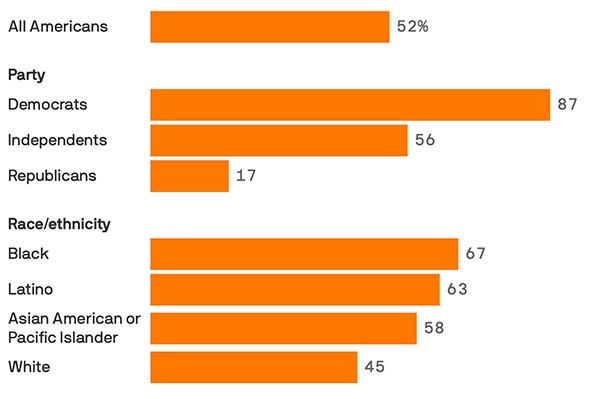
A majority of Americans think the president is a dangerous dictator. Think about that for a moment.
A whole other area to look at is how Trump did on his campaign promises. Here is a list of campaign promises that Trump has kept:
- Enact tariffs, including at least 60% on goods from China
- Ban transgender athletes from women's and girls' sports
- Stop cracking down on crypto
- Pardon all the Jan. 6 rioters
- Instruct federal agencies to cease promoting gender transition at any age
- Rehire service members who were canned due to their refusal to take the COVID vaccine
- Fire woke generals
- Sign an XO ending birthright citizenship
- "Seal" the border
- Declare an emergency and use the military for mass deportations
- Approve new oil drilling, pipelines, refineries, and power plants
- Terminate the IRA programs that were in the Green New Deal
- Upend the federal civil service
- Repeal Joe Biden's XO requiring that AI protect Americans' rights
It is quite a list. Unlike many politicians, Trump was open about what he wanted to do and did many of them. However, the courts have blocked him on some things, but at least he tried.
However, there are also some things he promised to do in the first 100 days and did not. Here is that list:
- Disclose who funded his presidential transition
- End the war in Ukraine in 24 hours
- Implement a mass deportation of immigrants on Day 1
- Bring prices down, starting on Day 1
Finally, there is a list of promises that are pending. He might do them and then again, he might not. Here is that list.
- Create an External Revenue Service
- Enact the largest tax cut in history
- End inflation
- Create an economic boom like no other
- Close the Department of Education
- Make in-vitro fertilization free
- Reinstate a ban on transgender troops
- Ban entry into the U.S. from terror-plagued countries
The bottom line is that he actually did pretty well at keeping quite a few of his promises. People who are surprised at what he is doing weren't paying attention. He telegraphed quite a bit of his program.
Since we are making lists, how about a list of Trump's biggest mistakes of the first 100 days? Here is one such list:
- Imposing crazy tariffs on "Liberation Day" and spooking the markets
- Giving Elon Musk real power and the spotlight; Democrats will tie Musk around Trump's neck for years
- Taking such a hard line on immigration and getting hit on it by multiple judges
- Abusing his powers and going after his enemies instead of focusing on trying to lower prices
- Blaming Ukraine for Russia's invasion
Finally, let's let the people have the last word on Trump's first 100 days. Marist College asked 1,439 American adults to grade Trump so far. Here are their grades:
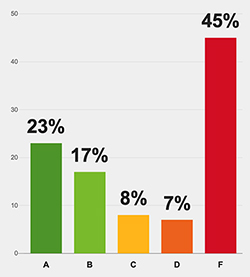
Trump failed. More people gave Trump an "F" than those who gave him an "A" or a "B" combined. In the crosstabs, 80% of Democrats gave him an "F" while only 5% of Republicans did. However, 49% of independents gave him an "F" vs. only 16% of independents who gave him an "A."
That's a lot of material and we are not even 7% into Trump's term yet. There are no doubt many surprises ahead. (V)
Donald Trump's Marvelous Megabill Keeps Getting Pushed Back
That was a 3,600-word rundown of the past 100 days. Now on to the future, specifically the Great Big Wonderful bill Trump wants. How is it doing? In three words: not so well. Donald Trump wanted it passed in his first 100 days. Well, the 100-day mark has come and gone and the bill hasn't even been written yet, let alone voted on or passed by either chamber of Congress. Last month, Speaker Mike Johnson (R-LA) set Memorial Day as the new target. Not a chance. Now Treasury Secretary Scott Bessent is hoping for Independence Day. Pretty soon it will be Christmas... 2026.
And Bessent isn't even talking about the whole bill, just the tax part and debt part. There is actually a deadline there. When the federal debt limit is reached, if the debt limit hasn't been raised, the treasury cannot issue any more bonds and might not be able to redeem existing ones, leading to a default. That would probably result in financial markets worldwide collapsing, resulting in a global depression. The exact date the debt limit is hit is not clear yet because there are tricks Bessent can use to delay the day of reckoning a little bit, but it is within a few months.
The House is taking the lead on the bill, with individual committees meeting to slash the budget in their areas of jurisdiction. The problem is that every single item in the budget is there because some member of Congress wanted it there. Sometimes multiple members. Even if the original sponsors are no longer in Congress, the interest groups that urged the member to include it are generally still around and so are their lobbyists. Cutting items isn't easy when there is virtually nothing in the budget that all 220 Republicans in the House hate. But the budget resolution requires big cuts in multiple areas. Herding all the cats won't be easy.
Even committees tasking with drafting relatively minor and uncontroversial parts of the budget are scrambling. This is what is making the deadline slip and slip again. The July 4 deadline is more wishful thinking than anything else. And since both chambers take off for a week around the holiday, if they miss by a day, they miss by a week. And in the worst case, the House is scheduled to recess on July 25 and not come back until Sept. 2. Given the earful members are getting at town halls lately, maybe they will decide it is safer to forget the recess and just stay in D.C. all summer.
And another little problem is that even if the House passes a bill, the Senate has to pass it as well. The House wants to cut $1.5 trillion in costs. The Senate wants to use magic accounting and basically not cut anything. Getting that worked out won't be easy.
Everyone is expecting the biggest fight to be over Medicaid, which impacts 70 million people, many of whom are voters. The budget resolution has instructed the Energy and Commerce Committee to cut almost a trillion dollars over the next 10 years. People are going to notice the consequences of that and not like it so much. A dozen House Republicans recently wrote a letter to the chairman of that committee, Rep. Brett Guthrie (R-KY), saying they will not vote for a bill that cuts Medicaid. Without their votes, there is no bill. All of them come from swing districts and probably mean it. The tension between the Republicans who will not vote for a bill with $1 trillion or more in cuts and the Republicans who voted for the budget resolution on the understanding that the knives are out will only get greater.
One unknown is how much lobbying Donald Trump will do. He hates getting into the weeds on anything, except maybe on his golf courses. If he lobbies individual House members, maybe he can convince them. But if they are convinced that voting for massive Medicaid cuts is a political death sentence, they may be faced with a choice of losing their job in a primary or losing their job in a general election. If they are convinced it is over, they could do what they think is best for their constituents and vote no. (V)
The Senate Confirms David Perdue as Ambassador to China
Being U.S. ambassador to China is no sinecure as the trade war revs up and the ambassador will have to defend the U.S. position to Chinese leaders. On Tuesday, the Senate confirmed former one-term senator from Georgia, David Perdue, to be ambassador to China by a vote of 67-29. At his hearing, Perdue said the relationship with China is the most consequential diplomatic challenge of the 21st century.
Fifteen Democrats voted for Perdue for the important post, even though he has no diplomatic experience. His experience as a one-term senator probably won't be of much value as ambassador. Before being in the Senate, he worked for Reebok and rejuvenated its brand of sneakers. Of course, the sneakers aren't made in the U.S. They are made in Vietnam.
After that stint, he worked for Dollar General, a store that sells cheap merchandise. That may work against him as ambassador. He probably thinks that China makes cheap junk. It does, but it also makes very high-tech products and is way ahead of the U.S. in advanced manufacturing. In addition, as CEO of Dollar General, he arranged selling the company to private equity company KKR. He got $42 million for that. Nice deal... until the lawsuits came saying that it was a sweetheart deal that hurt the stockholders. The company had to pay out $40 million to settle the claims, but Perdue did just fine. Is he really the diplomat of the century? (V)
Bezos Caves Again
Amazon sells many products from China and the prices are going to go up as the 145% tariff cuts in. Jeff Bezos doesn't want people to blame Amazon, so he was considering breaking out how much of the price of each item is product and how much is tariff, so customers would see that the price increases were Donald Trump's fault, not his.
When Donald Trump got word of this, he pitched a fit. Bezos got the message real fast and caved, saying that he had no intention of showing how much of each price was tariff. He seems to have forgotten that Trump is his king and he is a vassal. Of course, the management of Amazon's first duty is to shareholders, and shareholders will be hurt if people blame the site for a spike in prices, and take their business elsewhere (or just don't buy anywhere). We guess Bezos forgot that.
Trump is rightly worried that if people who shop on Amazon a lot are constantly reminded that he is the one responsible for their economic worries, it will be a disaster for him. But it is probably already too late. An NBC/Marist College poll released yesterday showed that 60% of Americans already blame the current economic problems on Trump. Only 39% blame Joe Biden.
This is not normal. In Jan. 2018, a year into Trump v1.0, only 40% thought the economic conditions were result of his policies. Now after only 3 months, more than half the country thinks so. If the economy tanks shortly when the tariffs really start kicking in, Trump is going to get the blame. He is clearly already very sensitive to that. (V)
Gerry Connolly Is Retiring
Rep. Gerald Connolly (D-VA), a long-serving liberal member of the House from Fairfax County, will not run for reelection. He said: "The sun is setting on my time in public service, and this will be my last term in Congress." His district, VA-11, is an affluent district in the D.C suburbs with a PVI of D+18. This will set off a feeding frenzy among ambitious Virginia Democrats, but will not put the seat in danger.
Connolly had cancer of the esophagus, it went into remission, and now it is back. It is so bad that he is immediately stepping down as ranking member of the powerful House Oversight Committee right now. This is not a good sign. Powerful members rarely give up their power willingly. The contest to replacing him as ranking member is now beginning. Rep. Stephen Lynch (D-MA) is interested, but he is 70 and many younger Democrats think it is time for a generational shift. Some of them are pushing for Rep. Alexandria Ocasio-Cortez. She is a bit of a longshot since she is not even a member of the committee.
Connolly's work will live on after he is gone. He was the driving force in building the D.C. Metro's Silver Line, which connects the capital to the Dulles International Airport. He also pushed hard for the redevelopment of Tysons Corner as well as the now-bustling Mosaic District. And he supported rural areas of his district, including the creation of a 40-mile hiking trail across Fairfax County. He was an all-too-rare-these-days congressman who cared about his constituents and tried to get things done for them, rather than grandstanding on hot-button issues. (V)
Previous | Next
Main page for smartphones